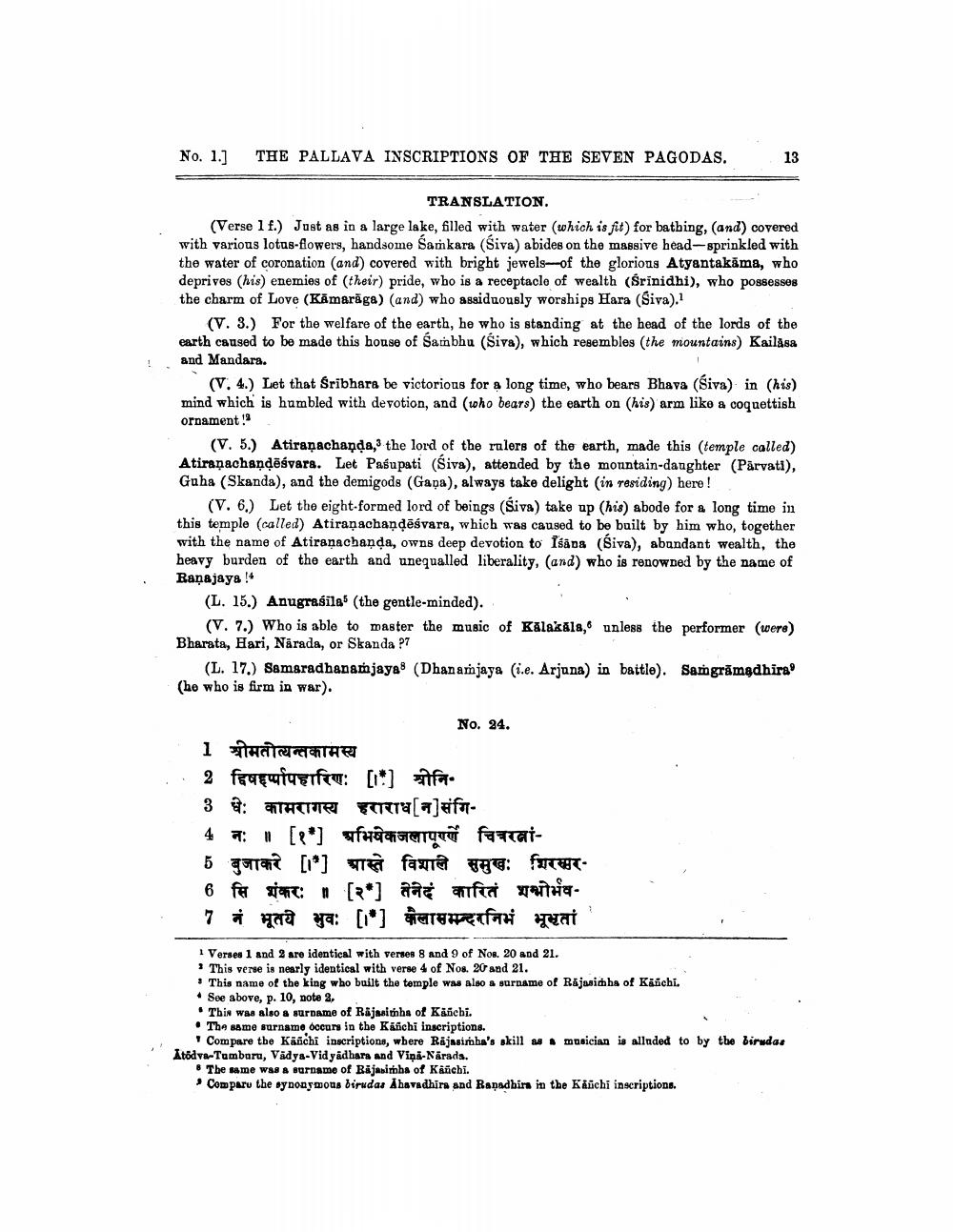________________
No. 1.]
THE PALLAVA INSCRIPTIONS OF THE SEVEN PAGODAS.
13
TRANSLATION. (Verse 1 f.) Just as in a large lake, filled with water (which is fit) for bathing, (and) covered with various lotus-flowers, handsome Samkara (Śiva) abides on the massive head-sprinkled with the water of coronation (and) covered with bright jewels of the glorions Atyantakāma, who deprives (his) enemies of (their) pride, who is a receptacle of wealth (Srinidhi), who possesses the charm of Love (Kamarăga) (and) who assiduously worships Hara (Śiva).
(V. 3.) For the welfare of the earth, he who is standing at the head of the lords of the earth caused to be made this house of Sambhu (Siva), which resembles (the mountains) Kailasa and Mandara.
(V. 4.) Let that Sribhara be victorious for a long time, who bears Bhava (Śiva) in (his) mind which is humbled with devotion, and (who bears) the earth on (his) arm like a coquettish ornament !
(V. 5.) Atiranachanda, the lord of the rulers of the earth, made this temple called) Atiranachandēsvara. Let Pasupati (Siva), attended by the mountain-daughter (Parvati), Guha (Skanda), and the demigods (Gaņa), always take delight (in residing) here!
(V. 6.) Let the eight-formed lord of beings (Śiva) take up (his) abode for a long time in this temple (called) Atiranachandēśvara, which was caused to be built by him who, together with the name of Atiranachanda, owns deep devotion to Išāds (Siva), abundant wealth, the heavy burden of the earth and unequalled liberality, (and) who is renowned by the name of Raņajaya !
(L. 15.) Anugrasile' (the gentle-minded).
(V. 7.) Who is able to master the music of Kalakala, unless the performer (were) Bharata, Hari, Nārada, or Skanda 27
(L. 17.) Samaradhanamjaya (Dhananjaya (i.e. Arjuna) in battle). Samgrāmadhirao (he who is firm in war).
No. 24. 1 TACITI STARI ... 2 f fuefro: [*] ifa.
3 : THTIT Ta[7]æfat4 : [*] fH fHTUT farai6 gata [*] faute vie: fer
6 fo : [**] was afrai gaitza. 7 o ya: [1"] HRUTH Tat
1 Verses 1 and 2 are identical with verses 8 and 9 of Nos. 20 and 21. * This verse is nearly identical with verse 4 of Nos. 20 and 21. • This name of the king who built the temple was also a surname of Rajmiths of Käichi. * See above, p. 10, note 3, . This was also a surname of Rajasths of Kifcbi. • The same surname occur in the Káfichi inscriptions.
Compare the Kanchi inscriptions, where Rajasimha's skill as musician is alluded to by the birdas Atõdva-Tambora, Vädya-Vid yadhara and Viņā-Närada.
* The same was a surname of Rajasimha of Katchi.
Com paru the synonymous dirudas Ahavadhirs and Ranadbin in the Kirchi inscriptions.




